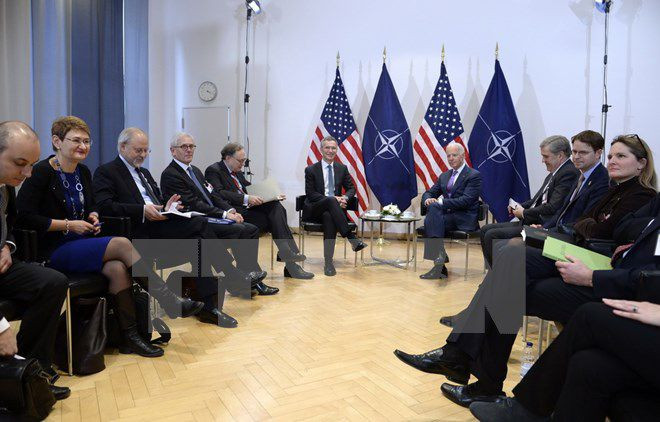Munich Security Conference ends with chance for Ukraine conflict
On February 8, the Munich Security Conference ended after three days of intensive work with a series of presentations, bilateral and multilateral meetings focusing on hot events in the world, especially the current crisis in Ukraine.
Speaking at the conference, German Foreign Minister Frank-Walter Steinmeier raised a series of hot spots of deep concern discussed by delegates attending the conference, such as Syria, Iraq, Iran, Libya, terrorism, cyber security, and especially the Ukraine crisis that is threatening peace in Europe.
 |
| US Vice President Joe Biden (right) and NATO Secretary General Jens Stoltenberg (left) at a meeting on the sidelines of the conference. (Photo: AFP/VNA) |
Foreign Minister Steinmeier affirmed that Germany is ready to be more involved in foreign policy, despite the fact that up to 70% of Germans expressed skepticism about whether Berlin should take on more role and responsibility in resolving conflicts around the world.
During the Ukraine crisis, Germany, along with the European Union (EU) and the North Atlantic Treaty Organization (NATO), always responded resolutely and unanimously, first of all to limit conflicts, resolve crises and move towards finding political solutions to the problem.
Foreign Minister Steinmeier asserted that sustainable security for Europe can only be achieved with Russia instead of against Moscow and vice versa, a good future for Russia can only be achieved with cooperation with Europe. In the context of a political solution to the Ukraine conflict is still quite far away, he said the intention to supply weapons to Ukraine is not only very dangerous but also counterproductive.
Mr. Steinmeier also emphasized three pillars of Germany's foreign policy, including continuing to contribute to strengthening multilateral institutions, especially within the EU and NATO framework; taking greater responsibility at the United Nations to be more actively involved in crisis management and maintaining the German world order; stepping up its involvement and tools to manage crises and conflicts in the world; and taking on special responsibilities for European security, including having to work with all parties to find a way out of the current conflict in Ukraine.
Foreign Minister Steinmeier also affirmed that Germany's goal is to resolve the Ukraine crisis, avoid new confrontation between the East and the West, and contribute to strengthening world order.
Also related to the situation in Ukraine, before leaving for the US on February 8, German Chancellor Angela Merkel had a phone call with Russian President Vladimir Putin, French President Francois Hollande and Ukrainian President Petro Poroshenko to discuss the Ukraine issue. The four leaders agreed to hold a four-way summit on February 11 in Minsk, the capital of Belarus.
German government spokesman Steffen Seibert said that during the phone call, the four leaders continued to discuss a package of measures to resolve the crisis in Ukraine. This is considered the first result of the German-French peace initiative after weeks of escalating military tensions in Eastern Ukraine.
In his first reaction to the news of the Normandy Group meeting, Russian President Putin said he had asked Belarusian President Aleksandr Lukashenko to prepare well for the meeting, and said that the parties must first agree on their views before entering the summit in Minsk.
Russian Foreign Minister Sergei Lavrov also expressed hope that the goodwill of the parties involved in the negotiations will yield results. Meanwhile, the German Foreign Minister said that the Ukraine crisis has reached the point of no return, and it would be "irresponsible" for the parties to let slip the last chance to resolve this conflict.
According to media sources, the crisis in Ukraine has so far killed more than 55,000 people./.
According to VNA
